Letters from Arthur Seaforth Blackburn to his family, 1941 - Part 7
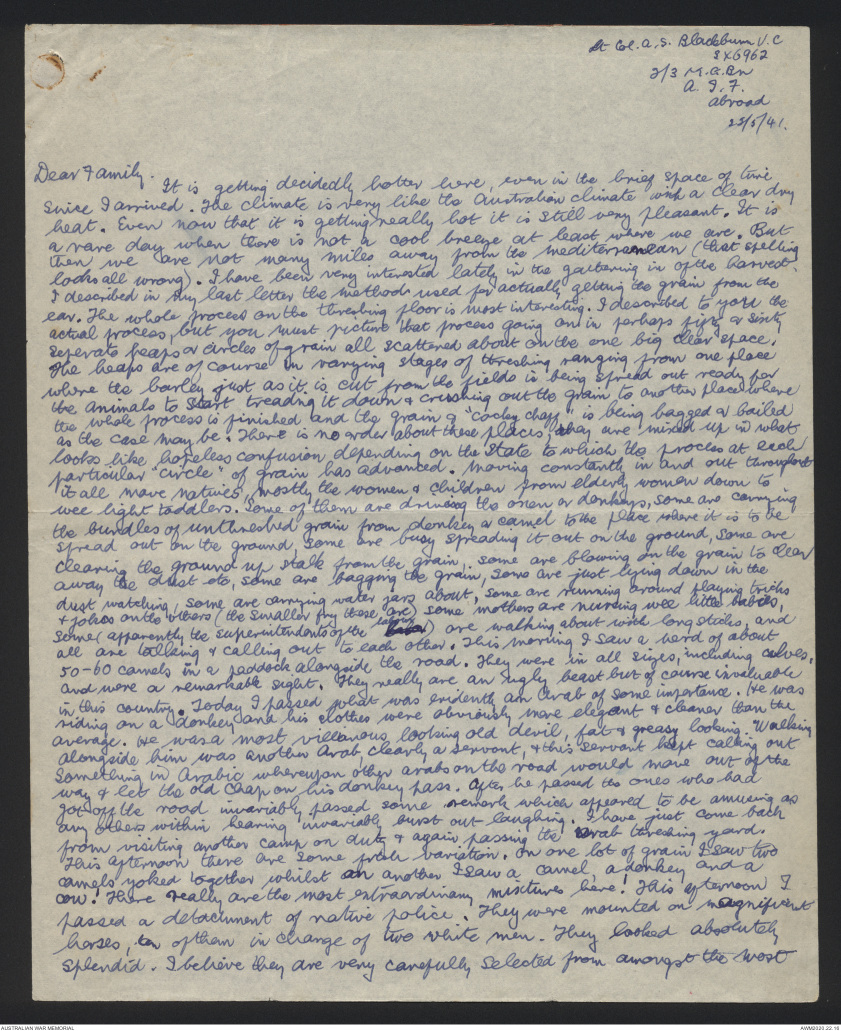
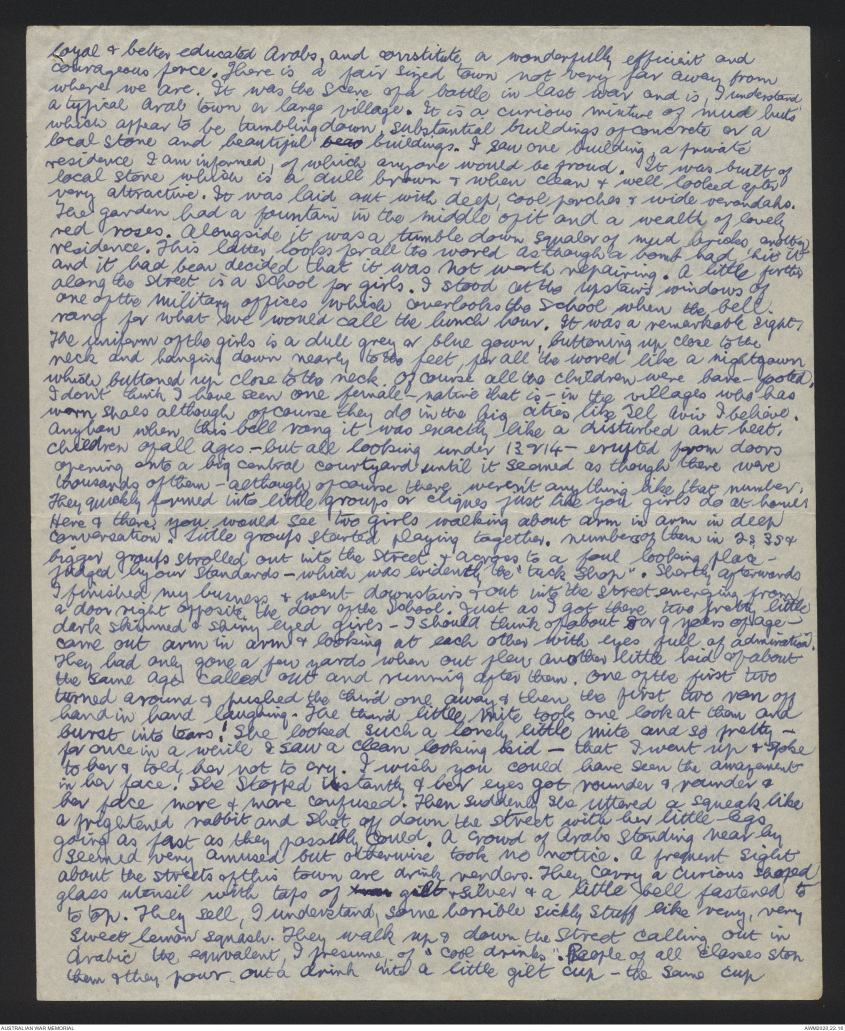
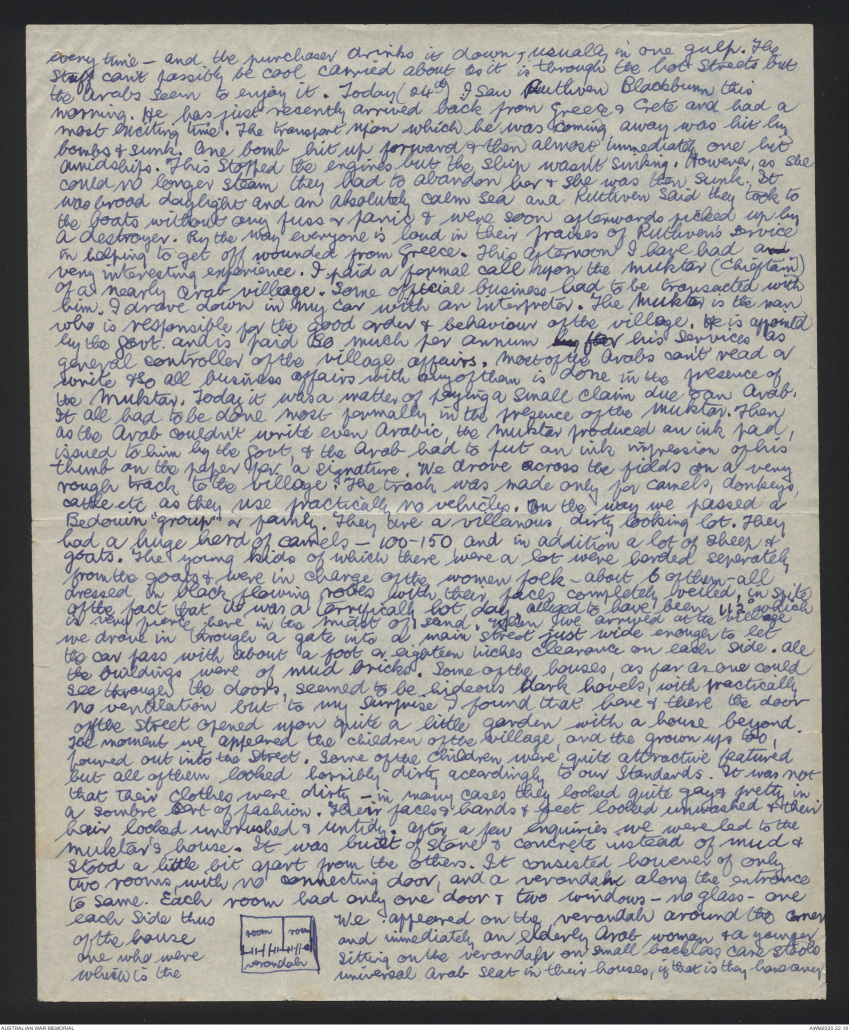
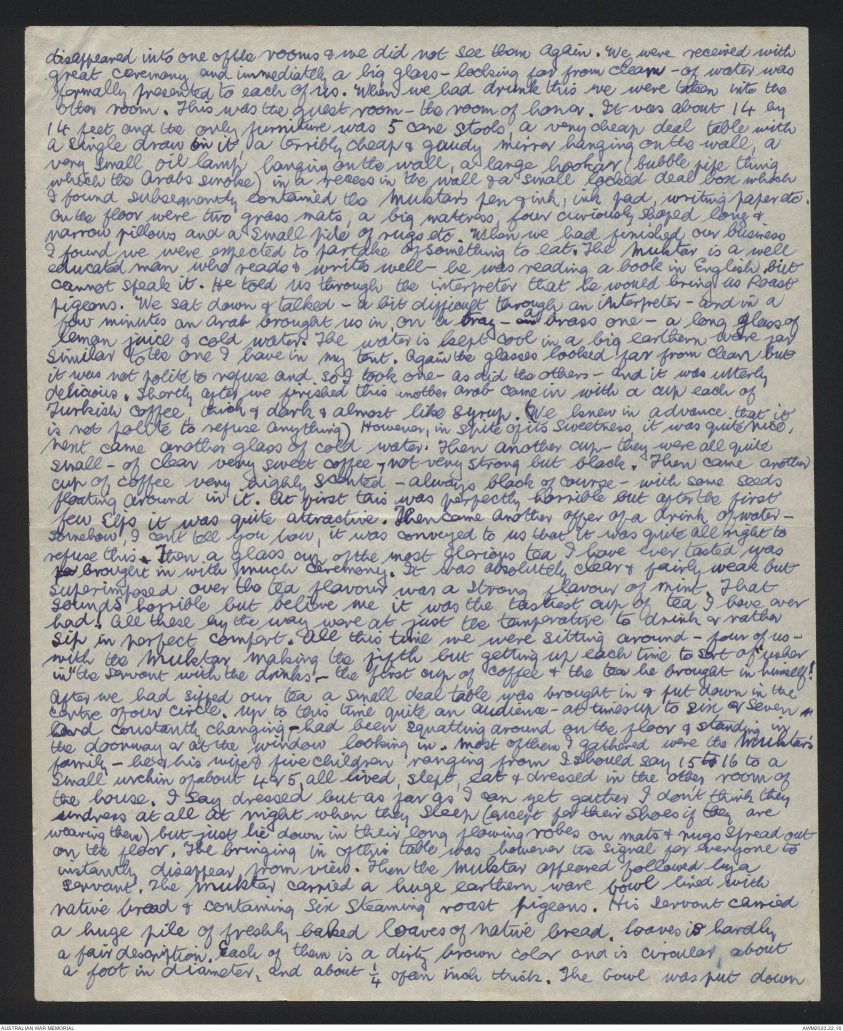
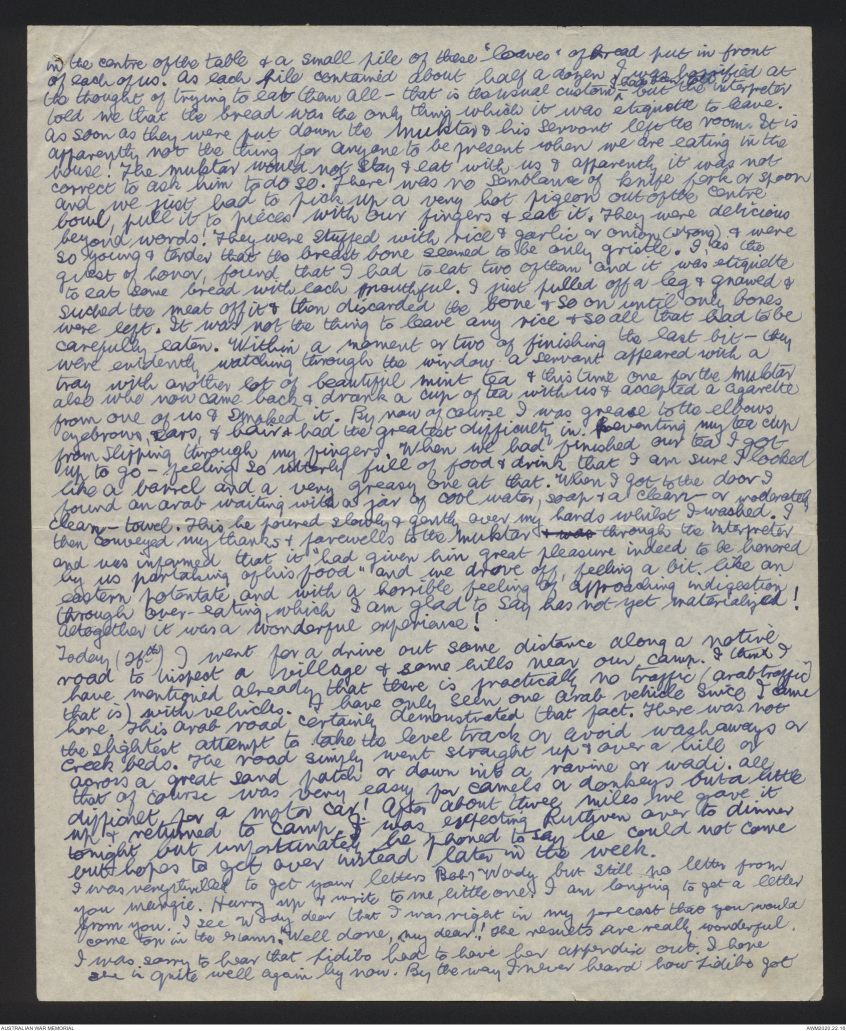
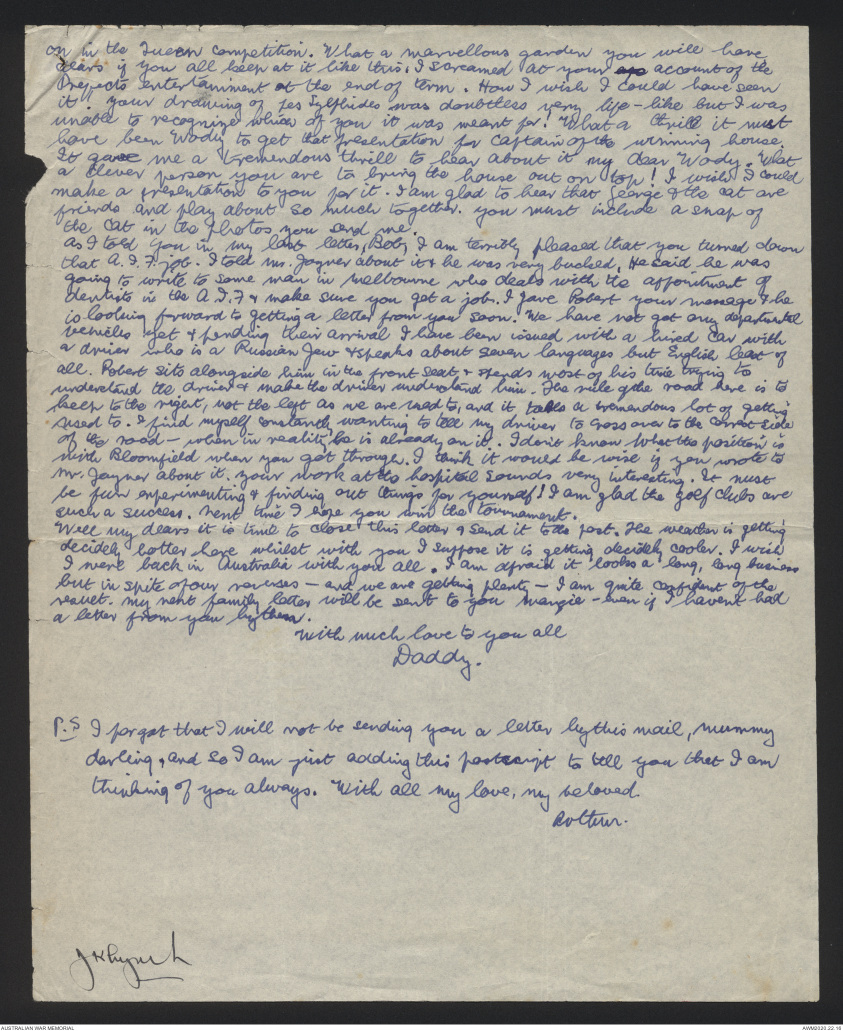
Lt Col. A. S. Blackburn V.C
SX6962
2/3 M.G. Bn
A.I.F.
abroad
25/5/41.
Dear Family.
It is getting decidedly hotter here, even in the brief space of time
since I arrived. The climate is very like the Australian climate with a clear dry
heat. Even now that it is getting really hot it is still very pleasant. It is
a rare day when there is not a cool breeze at least where we are. But
then we are not many miles away from the mediterranean (that spelling
looks all wrong). I have been very interested lately in the gathering in of the harvest.
I described in my last letter the method used for actually getting the grain from the
ear. The whole process on the threshing floor is most interesting. I described to you
the actual process, but you must picture that process going on in perhaps fifty or sixty
seperate heaps or circles of grain all scattered about on the one big clear space.
The heaps are of course in varying stages of threshing ranging from one place
where the barley just as it is cut from the fields is being spread out ready for
the animals to start treading it down & crushing out the grain to another place where
the whole process is finished and the grain & "cooley chaff" is being bagged or bailed
as the case may be. There is no order about these places, they are mixed up in what
looks like hopeless confusion depending on the state to which the process at each
particular "circle" of grain has advanced. Moving constantly in and out throughout
it all move natives, mostly the women & children from elderly women down to
wee light toddlers. Some of them are driving the oxen or donkeys, some are carrying
the bundles of unthreshed grain from donkey or camel to the place where it is to be
spread out on the ground, some are busy spreading it out on the ground, some are
clearing the ground up stalk from the grain, some are blowing on the grain to clear
away the dust etc, some are bagging the grain, some are just lying down in the
dust watching, some are carrying water jars about, some are running around playing tricks
& jokes on the others (the smaller fry these are) some mothers are nursing wee little babies,
Some (apparently the superintendents of the labor labour) are walking about with long sticks, and
all are talking & calling out to each other. This morning I saw a herd of about
50-60 camels in a paddock alongside the road. They were in all sizes, including calves,
and were a remarkable sight. They really are an ugly beast but of course invaluable
in this country. Today I passed what was evidently an Arab of some importance. He was
riding on a donkey and his clothes were obviously more elegant & cleaner than the
average. He was a most villainous looking old devil, fat & greasy looking. Walking
alongside him was another Arab, clearly a servant, & this servant kept calling out
something in Arabic whereupon other arabs on the road would move out of the
way & let the old chap on his donkey pass. After he passed the ones who had
got off the road invariably passed some remark which appeared to be amusing as
any others within hearing invariably burst out laughing. I have just come back
from visiting another camp on duty & again passing the arab threshing yard.
This afternoon there are some fresh variation. On one lot of grain I saw two
camels yoked together whilst on another I saw a camel, a donkey and a
cow! There really are the most extraordinary mixtures here! This afternoon I
passed a detachment of native police. They were mounted on magnificent
horses, ten of them in charge of two white men. They looked absolutely
splendid. I believe they are very carefully selected from amongst the most
loyal & better educated Arabs, and constitute a wonderfully efficient and
courageous force. There is a fair sized town not very far away from
where we are. It was the scene of a battle in last war and is, I understand,
a typical Arab town or large village. It is a curious mixture of mud huts
which appear to be tumbling down, substantial buildings of concrete or a
local stone and beautiful beas buildings. I saw one building, a private
residence I am informed, of which anyone would be proud. It was built of
local stone which is a dull brown & when clean & well looked after
very attractive. It was laid out with deep, cool porches & wide verandahs.
The garden had a fountain in the middle of it and a wealth of lovely
red roses. Alongside it was a tumble down squalor of mud bricks, another
residence. This latter looks for all the world as though a bomb had hit it
and it had been decided that it was not worth repairing. A little further
along the street is a school for girls. I stood at the upstairs windows of
one of the military offices which overlooks the school when the bell
rang for what we would call the lunch hour. It was a remarkable sight.
The uniform of the girls is a dull grey or blue gown, buttoning up close to the
neck and hanging down nearly to the feet, for all the world like a nightgown
which buttoned up close to the neck. Of course all the children were bare-footed.
I don't think I have seen one female - native that is - in the villages who has
worn shoes although of course they do in the big cities like Tel Aviv I believe.
Anyhow when this bell rang it was exactly like a disturbed ant nest,
children of all ages - but all looking under 13 or 14- erupted from doors
opening onto a big central courtyard until it seemed as though there were
thousands of them- although of course there weren't anything like that number.
They quickly formed into little groups or cliques just like you girls do at home.
Here & there you would see two girls walking about arm in arm in deep
conversation. Little groups started playing together. Numbers of them in 2s & 3s &
bigger groups strolled out into the street & across to a foul looking place -
judged by our standards - which was evidently the "tuck shop". Shortly afterwards
I finished my business & went downstairs & out into the street emerging from
a door right opposite the door of the school. Just as I got there two pretty little
dark skinned & shiny eyed girls - I should think of about 8 or 9 years of age -
came out arm in arm & looking at each other with eyes full of admiration.
They had only gone a few yards when out flew another little kid of about
the same age called out and running after them. One of the first two
turned around & pushed the third one away & then the first two ran off
hand in hand laughing. The third little mite took one look at them and
burst into tears! She looked such a lonely little mite and so pretty -
for once in a while I saw a clean looking kid - that I went up & spoke
to her & told her not to cry. I wish you could have seen the amazement
in her face. She stopped instantly & her eyes got rounder & rounder &
her face more & more confused. Then suddenly she uttered a squeak like
a frightened rabbit and shot off down the street with her little legs
going as fast as they possibly could. A crowd of Arabs standing near by
seemed very amused but otherwise took no notice. A frequent sight
about the streets of this town are drink vendors. They carry a curious shaped
glass utensil with taps of gilt & silver & a little bell fastened to
to top. They sell, I understand, some horrible sickly stuff like very, very sweet lemon squash. They walk up & down the street calling out in
Arabic the equivalent, I presume, of "cool drinks". People of all classes stop
them & they pour out a drink into a little gilt cup - the same cup
every time - and the purchaser drinks it down, usually in one gulp. The
stuff can't possibly be cool carried about as it is through the hot streets but
the Arabs seem to enjoy it. Today (24th) I saw Ruthven Blackburn this
morning. He has just recently arrived back from Greece & Crete and had a
most exciting time. The transport upon which he was coming away was hit by
bombs & sunk. One bomb hit up forward & then almost immediately one hit
amidships. This stopped the engines but the ship wasn't sinking. However, as she
could no longer steam they had to abandon her & she was then sunk. It
was broad daylight and an absolutely calm sea and Ruthven said they took to
the boats without any fuss or panic & were soon afterwards picked up by
a destroyer. By the way everyone is loud in their praises of Ruthven's service
in helping to get off wounded from Greece. This afternoon I have had and
very interesting experience. I paid a formal call upon the Muktar (Chieftain)
of a nearly Arab village. Some official business had to be transacted with
him. I drove down in my car with an interpreter. The Muktar is the man
who is responsible for the good order & behaviour of the village. He is appointed
by the govt. and is paid so much per annum for his services as
general controller of the village affairs. Most of the Arabs can't read or
write & so all business affairs with any of them is done in the presence of
the Muktar. Today it was a matter of paying a small claim due to an Arab.
It all had to be done most formally in the presence of the Muktar. Then
as the Arab couldn't write even Arabic, the Muktar produced an ink pad,
issued to him by the Govt, & the Arab had to put an ink impression of his
thumb on the paper for a signature. We drove across the fields on a very
rough track to the village. The track was made only for camels, donkeys
cattle etc as they use practically no vehicles. On the way we passed a
Bedouin "group" or family. They are a villanous dirty looking lot. They
had a huge herd of camels - 100-150 and in addition a lot of sheep &
goats. The young kids of which there were a lot were herded seperately
from the goats & were in charge of the women folk - about 6 of them - all
dressed in black flowing robes with their faces completely veiled, in spite
of the fact it was a terrifically hot day, alleged to have been 112o which
is very fierce here in the midst of sand. When we arrived at the village
we drove in through a gate into the main street just wide enough to let
the car pass with about a foot or eighteen inches clearance on each side. All
the buildings were of mud bricks. Some of the houses, as far as one could
see through the doors, seemed to be hideous dark hovels, with practically
no ventilation but to my surprise I found that here & there the door
off the street opened upon quite a little garden with a house beyond.
The moment we appeared the children of the village, and the grown ups too,
poured out into the street. Some of the children were quite attractive featured
but all of them looked horribly dirty accordingly to our standards. It was not
that their clothes were dirty - in many cases they looked quite gay & pretty in
a sombre sort of fashion. Their faces & hands & feet looked unwashed & their
hair looked unbrushed & untidy. After a few enquiries we were led to the
Muktar's house. It was built of stone & concrete instead of mud &
stood a little bit apart from the others. It consisted however of only
two rooms, with no connecting door, and a verandah along the entrance
to same. Each room had only one door & two windows - no glass- one
each side thus We appeared on the verandah around the annex
of the house and immediately an elderly Arab woman & a younger
one who were sitting on the verandah on small backless cane stools
which is the universal Arab seat in their houses, if that is they have any
disappeared into one of the rooms & we did not see them again. We were received with
great ceremony and immediately a big glass - looking far from clean - of water was
formally presented to each of us. When we had drunk this we were taken into the
other room. This was the guest room - the room of honor. It was about 14 by
14 feet, and the only furniture was 5 cane stools, a very cheap deal table with
a single draw in it, a terribly cheap & gaudy mirror hanging on the wall, a
very small oil lamp hanging on the wall, a large hookar (bubble pipe thing
which the Arabs smoke) in a recess in the wall & a small locked deal box which
I found subsequently contained the Muktar's pen & ink, ink pad, writing paper etc.
On the floor were two grass mats, a big mattress, four curiously shaped long &
narrow pillows and a small pile of rugs etc. When we had finished our business
I found we were expected to partake of something to eat. The Muktar is a well
educated man who reads & writes well - he was reading a book in English but
cannot speak it. He told us through the interpreter that he would bring us Roast
pigeons. We sat down & talked - a bit difficult through an interpreter - and in a
few minutes an Arab brought us in, on a tray - an a brass one - a long glass of
lemon juice & cold water. The water is kept cool in a big earthern ware jar
similar to the one l have in my tent. Again the glasses looked far from clean but
it was not polite to refuse and so I took one - as did the others - and it was utterly
delicious. Shortly after we finished this another Arab came in with a cup each of
Turkish coffee, thick & dark & almost like syrup. (We knew in advance that it
is not polite to refuse anything) However, in spite of its sweetness it was quite nice,
next came another glass of cold water. Then another cup - they were all quite
small- of clean very sweet coffee - not very strong but black. Then came another
cup of coffee very highly scented - always black of course- with some seeds
floating around in it. At first this was perfectly horrible but after the first
few sips it was quite attractive. Then came another offer of a drink of water-
somehow, I can't tell you how, it was conveyed to us that it was quite all right to
refuse this. Then a glass cup of the most glorious tea I have ever tasted waspor brought in with much ceremony. It was absolutely clear & fairly weak but
superimposed over the tea flavour was a strong flavour of mint. That
sounds horrible but believe me it was the tastiest cup of tea I have ever
had. All these by the way were at just the temperature to drink or rather
sip in perfect comfort. All this time we were sitting around - four of us-
with the Muktar making the fifth but getting up each time to sort of usher
in the servant with the drinks - the first cup of coffee & the tea he brought in himself!
After we had sipped our tea a small deal table was brought in & put down in the
centre of our circle. Up to this time quite an audience - at times up to six or seven
and constantly changing - had been squatting around on the floor & standing in
the doorway & at the window looking in. Most of them I gathered were the Muktar's
family - he & his wife & five children ranging from I should say 15 to 16 to a
small urchin of about 4 or 5, all lived, slept, eat & dressed in the other room of
the house. I say dressed but as far go I can yet gather I don't think they
undress at all at night when they sleep (except for their shoes if they are
wearing them) but just lie down in their long flowing robes on mats & rugs spread out
on the floor. The bringing in of this table was however the signal for everyone to
instantly disappear from view. Then the Muktar appeared followed by a
servant. The Muktar carried a huge earthern ware bowl lined with
native bread & containing six steaming roast pigeons. His servant carried
a huge pile of freshly baked loaves of native bread, loaves is hardly
a fair description. Each as them is a dirty brown color and is circular, about
a foot in diameter, and about ¼ of an inch thick. The bowl was put down
in the centre of the table & a small pile of these "loaves" of bread put in front
of each of us. As each pile contained about half a dozen I was horrified at
the thought of trying to eat them all - that is the usual custom I had been told - but the interpreter
told me that the bread was the only thing which it was etiquette to leave.
As soon as they were put down the Muktar & his servant left the room. It t is
apparently not the thing for anyone to be present when we are eating in the
house. The Muktar would not stay & eat with us & apparently it was not
correct to ask him to do so. There was no semblance of knife fork or spoon
and we just had to pick up a very hot pigeon out of the centre
bowl, pull it to pieces with our fingers & eat it. They were delicious
beyond words! They were stuffed with rice & garlic or onion (strong) & were
so young a tender that the breast bone seemed to be only gristle. I, as the
guest of honor, found that I had to eat two of them and it was etiquette
to eat some bread with each mouthful. I just pulled off a leg & gnawed &
sucked the meat off it & then discarded the bone & so on until only bones
were left. It was not the thing to leave any rice & so all that had to be
carefully eaten. Within a moment or two of finishing the last bit - they
were evidently watching through the window a servant appeared with a
tray with another lot of beautiful mint tea & this time one for the Muktar
also who now came back & drank a cup of tea with us & accepted a cigarette
from one of us & smoked it. By now of course I was grease to the elbows
eyebrows, ears & hair and had the greatest difficulty in preventing my tea cup
from slipping through my fingers. When we had finished our tea I got
up to go - feeling so utterly full of food & drink that I am sure I looked
like a barrel and a very greasy one at that. When I got to the door I
found an arab waiting with a jar of cool water, soap & a clean or moderately
clean - towel. This he poured slowly & gently over my hands whilst I washed. I
then conveyed my thanks & farewells to the Muktar & was through the interpreter
and was informed that it "had given him great pleasure indeed to be honored
by us partaking of his food" and we drove off, feeling a bit like an
eastern potentate, and with a horrible feeling of approaching indigestion
through over-eating, which I am glad to say has not yet materialized!
Altogether it was a wonderful experience!
Today (26th) I went for a drive out same distance along a native
road to inspect a village & some hills near our camp. I think I
have mentioned already that there is practically no traffic (Arab traffic
that is) with vehicles. I have only seen one Arab vehicle since I came
here. This Arab road certainly demonstrated that fact. There was not
the slightest attempt to take the level track or avoid wash aways or
creek beds. The road simply went straight up & over a hill of
across a great sand patch or down into a ravine or wadi. All
that of course was very easy for camels or donkeys but a little
difficult for a motor car! After about three miles we gave it
up & returned to camp. I was expecting Ruthven over to dinner
tonight but unfortunately he phoned to say he could not come
but hopes to get over instead later in the week.
I was very thrilled to get your letters Rob & Wody but still no letter from
you Margie. Hurry up & write to me, little one. I am longing to get a letter
from you. I see Wody dear that I was right in my forecast that you would
come top in the exams. Well done, my dear! The results are really wonderful.
I was sorry to hear that [[Fidibo??]] had to have her appendix out. I hope
she is quite well again by now. By the way I never heard how [[Fidibo??]] got
on in the Queen competition. What a marvellous garden you will have
dears if you all keep at it like this. I screamed at your are account of the
Prefects entertainment at the end of term. How I wish I could have seen
it. Your drawing of Les Sylphides was doubtless very life-like but I was
unable to recognize which of you it was meant for! What a thrill it must
have been Wody to get that presentation for captain of the winning house.
It gave me a tremendous thrill to hear about it my dear Wody. What
a clever person you are to bring the house out on top! I wish I could
make a presentation to you for it. I am glad to hear that George & the cat are
friends and play about so much together. you must include a snap of
the cat in the photos you send me.
As I told you in my last letter, Bob, I am terribly pleased that you turned down
that A.I.F. job. I told Mr Joyner about it & he was very bucked. He said he was
going to write to some man in Melbourne who deals with the appointment of
dentists in the A.I.F. & make sure you get a job. I gave Robert your message & he
is looking forward to getting a letter from you soon. We have not got any departmental
vehicles yet & pending their arrival I have been issued with a hired car with
a driver who is a Russian Jew & speaks about seven languages but English least of
all. Robert sits alongside him in the front seat & spends most of his time trying to
understand the driver & make the driver understand him. The rule of the road here is to
keep to the right, not the left as we are used to, and it takes a tremendous lot of getting
used to. I find myself constantly wanting to tell my driver to cross over to the correct side
of the road - when in reality he is already on it. I don't know what the position is
with Bloomfield when you get through. I think it would be wise if you wrote to
Mr Jaynor about it. Your work at the hospital sounds very interesting. It must
be fun experimenting & finding out things for yourself! I am glad the golf clubs are
such a success. Next time I hope you win the tournament.
Well my dears it is time to close this letter & send it to the post. The weather is getting
decidely hotter here whilst with you I suppose it is getting decidely cooler. I wish
I were back in Australia with you all. I am afraid it looks a long, long business
but in spite of our reverses - and we are getting plenty - I am quite confident of the
result. My next family letter will be sent to you Margie - even if I haven't had
a letter from you by then.
With much love to you all
Daddy
PS I forgot that I will not be sending you a letter by this mail, mummy
darling, and so I am just adding this postscript to tell you that I am
thinking of you always. With all my love, my beloved.
Arthur
JK Lynch
 Jacqueline Kennedy
Jacqueline KennedyThis transcription item is now locked to you for editing. To release the lock either Save your changes or Cancel.
This lock will be automatically released after 60 minutes of inactivity.